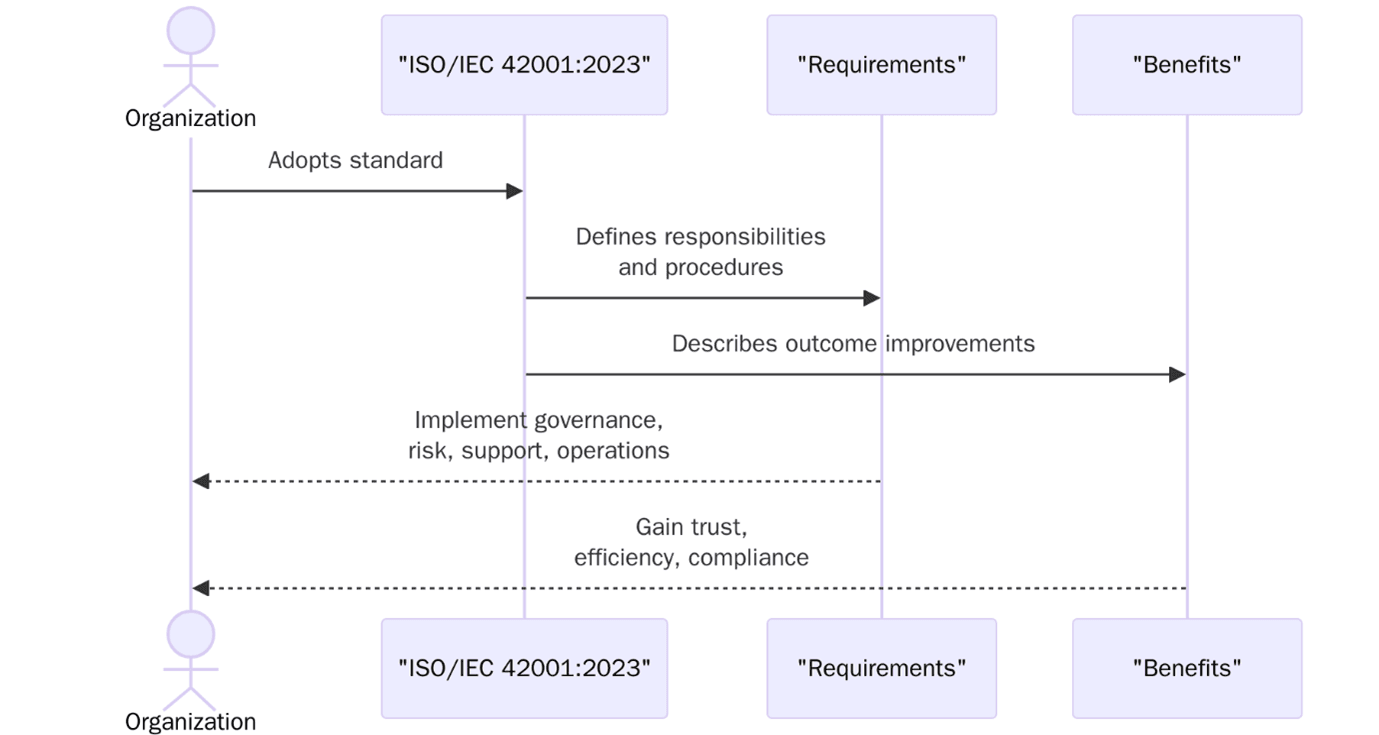What is ISO/IEC 42001:2023 – What is this Standard?
ISO/IEC 42001:2023 is the world’s first international standard that specifies requirements for a management system for artificial intelligence (AI). Developed by ISO and IEC, this groundbreaking standard provides organizations with a structured framework to govern, manage and deploy AI systems responsibly, ethically and effectively.

ISO/IEC 42001 addresses organizational governance, covering risks, ethics, transparency, accountability, data management, and human oversight. The standard helps in building trust in AI and ensures that AI use aligns with laws, societal values, and stakeholder expectations.
Applicable to any organization developing, using, or managing AI systems, ISO/IEC 42001 is a critical step in establishing governance around this fast-evolving technology.
Need help aligning your AI practices with ISO/IEC 42001? Contact support@pacificcert.com
What is the Scope and Applicability of ISO/IEC 42001:2023?
ISO/IEC 42001:2023 applies to:
- Tech companies and startups developing AI-powered platforms or products
- Enterprises adopting AI in customer service, logistics, marketing, or operations
- Healthcare, banking, insurance, and legal sectors deploying predictive models
- Government agencies using AI in citizen services, surveillance, or compliance
- Academic institutions and research labs exploring machine learning or neural networks
The standard is technology-neutral and applies regardless of the algorithm, model, or data structure. Whether you’re using generative AI, natural language processing (NLP), image recognition, or decision-support systems, ISO/IEC 42001 ensures that your organization applies ethical and legally aligned governance.
Want to know if ISO/IEC 42001 applies to your use of AI? Contact us at support@pacificcert.com!
What is the Certification Process of ISO/IEC 42001:2023?
ISO/IEC 42001 is a certifiable management system standard. Organizations can demonstrate their conformance through third-party audits and obtain formal certification.
The Certification Process Involves:
- Gap Assessment – Evaluate your current AI governance practices against ISO/IEC 42001 requirements.
- Policy and Risk Framework Development – Establish principles on AI ethics, human oversight, and data protection.
- Implementation – Assign responsibilities, implement risk controls, and deploy mechanisms for traceability and explainability.
- Internal Audits and Management Review – Evaluate system performance and compliance.
- Third-Party Certification Audit – Carried out by an accredited body such as Pacific Certifications.
We provide complete certification guidance, from audit to post-certification compliance. Contact support@pacificcert.com for details!
Clause-wise Structure – ISO/IEC 42001:2023
Clause | Title | Description |
1 | Scope | Defines the applicability of the standard to organizations that provide or use AI-based products or services. |
2 | Normative References | Lists references that are essential for the application of this standard. |
3 | Terms and Definitions | Defines key terms used in the context of AI, including explainability, bias, robustness, etc. |
4 | Context of the Organization | Requires the organization to identify internal and external issues relevant to its AI systems and stakeholders. |
5 | Leadership | Describes responsibilities of top management in establishing AI policy, roles, and accountability for AIMS. |
6 | Planning | Covers identification of AI risks and opportunities, objectives, and planning actions to address them. |
7 | Support | Outlines requirements for resources, competence, awareness, communication, and documentation related to AI systems. |
8 | Operation | Focuses on planning, designing, implementing, validating, and maintaining AI systems in a responsible and secure manner. |
9 | Performance Evaluation | Involves monitoring, measuring, analyzing, and evaluating the performance and compliance of the AI management system. |
10 | Improvement | Specifies actions for continual improvement, nonconformity management, and corrective actions in the AI lifecycle. |
How to Implement ISO/IEC 42001:2023 in Your Organization?
Successful implementation of ISO/IEC 42001 requires organizations to shift from ad hoc AI practices to formalized AI governance.
Steps to implement include:
- Define AI Use Cases and Scope – Identify all systems, departments, and third parties involved in AI lifecycle activities.
- Establish an AI Management Policy – Outline ethical principles, risk thresholds, and compliance obligations.
- Conduct AI Risk Assessments – Evaluate algorithmic bias, privacy impact, autonomy, safety, and human control aspects.
- Implement Governance Controls – Set up review boards, audit trails, approval gates, and traceability protocols.
- Ensure Stakeholder Awareness – Provide AI-specific training, assign accountability, and clarify human-AI roles.
- Monitor and Improve – Use metrics like model drift, bias detection, and human-in-the-loop oversight to drive continual improvement.
Need help with ISO/IEC 42001 implementation or AI governance strategy? Reach us at support@pacificcert.com!
What Documentation is Required for ISO/IEC 42001:2023?
Organizations implementing ISO/IEC 42001 will need to maintain:
- AI governance policy and objectives
- AI lifecycle risk assessments and control plans
- Records of human oversight mechanisms
- Technical documentation on AI models and datasets
- Stakeholder engagement and explainability records
- Data governance and data protection impact assessments
- Incident logs and ethical review records
- Internal audit reports and corrective actions
We provide audit and certification support for developing AI governance documentation. Contact support@pacificcert.com!
What are the Eligibility Criteria for ISO/IEC 42001:2023?
ISO/IEC 42001 applies to any organization that:
- Develops, deploys, manages, or commissions AI systems
- Uses machine learning or automated decision-making tools
- Handles high-risk data (health, financial, biometric)
- Operates in regulated environments requiring data ethics or AI transparency
- Wants to demonstrate responsible AI practices to stakeholders
If you are unsure about your eligibility or readiness, contact us at support@pacificcert.com for a consultation.
What are the Certification Costs of ISO/IEC 42001:2023?
The cost of ISO/IEC 42001 certification depends on several key factors, including the size of the company, the number of employees and locations, and the complexity of the AI systems being used or developed. If your company already follows other ISO standards like ISO 27001 or ISO 9001, the cost may be lower due to easier integration.
Costs also depend on whether you need help with documentation, internal audits, or training before the main certification audit. Finally, the total cost is based on the certification body’s fees and whether the audit is done onsite or remotely.
Pacific Certifications offers cost-effective certification packages contact us today support@pacificcert.com for a quote!
What is the Certification Timeline of ISO/IEC 42001:2023?
Week | Activities |
Week 1 | Gap analysis, scoping, and stakeholder alignment |
Week 2 | Policy development and risk framework setup |
Week 3 | Technical and ethical control implementation |
Week 4 | Internal audits, training, and corrective actions |
Week 5 | Management review and performance validation |
Week 6 | Third-party certification audit and compliance adjustments |
What are the Requirements of ISO/IEC 42001:2023?
ISO/IEC 42001 requires organizations to implement an AI Management System (AIMS) covering:

- Organizational Context – Identify how AI affects business goals, stakeholders, and risks.
- Leadership – Ensure top management commitment to responsible AI use and governance.
- AI Risk Management – Classify risks based on impact, transparency, data bias, and explainability.
- Policies and Objectives – Set principles for human oversight, data ethics, and model performance.
- Resources and Competence – Train personnel, assign AI roles, and ensure access to technical capabilities.
- Operational Controls – Include data quality measures, audit trails, testing protocols, and security safeguards.
- Monitoring and Evaluation – Use key performance indicators to track AI fairness, accuracy, safety, and bias.
- Continual Improvement – Establish a review cycle to update models, mitigate risk, and respond to feedback.
Need help translating these requirements into your AI systems? Contact support@pacificcert.com today!
What are the Benefits of ISO/IEC 42001:2023?
- Demonstrates that your AI systems are transparent, accountable, and aligned with ethical principles.
- Prepares organizations for compliance with current and upcoming AI legislation such as the EU AI Act and national data laws.
- Addresses concerns around bias, fairness, data privacy, and safety through structured risk management.
- Clients, investors, and regulators gain assurance that your organization governs AI responsibly.
- Enables fast deployment of AI while maintaining safety, governance, and social responsibility.
- Aligns AI activities with data protection frameworks (ISO/IEC 27701, GDPR, HIPAA etc).
- Certified AI governance helps win contracts, attract ethical investors, and lead in tech ecosystems.
- Built on Annex SL, ISO/IEC 42001 aligns with ISO 27001, ISO 9001, ISO 22301, and others.

As of 2025, AI regulations are tightening globally. The EU AI Act, set to take effect in stages from 2025–2026, introduces risk-based compliance obligations for AI systems. Similarly, India’s Digital India Act, the U.S. NIST AI Risk Framework, and the OECD AI Principles demand accountability and transparency in AI usage.
According to a 2025 McKinsey Global AI Survey, 61% of organizations using AI in high-stakes decisions lack formal governance systems. ISO/IEC 42001 provides the urgently needed structure to fill this gap.
Companies adopting ISO/IEC 42001 are leading in AI ethics, winning procurement contracts, reducing regulatory risk, and building sustainable innovation ecosystems.
Want to future-proof your AI programs? Let’s talk, email us at support@pacificcert.com or call at 91-8595603096
How Pacific Certifications Can Help?
At Pacific Certifications, we offer:
- Conducting Stage 1 and Stage 2 certification audits to evaluate your AI governance, risk controls, and compliance with ISO/IEC 42001 requirements
- Reviewing your documentation and processes to ensure they align with the standard’s clauses related to leadership, planning, AI lifecycle controls, and continual improvement
- Providing a detailed audit report highlighting strengths, nonconformities (if any), and opportunities for improvement
- Issuing a globally recognized ISO/IEC 42001:2023 certificate upon successful audit completion
- Performing annual surveillance audits and recertification audits every three years to ensure continued conformity.
Our team works with AI startups, enterprise tech teams, universities, and public institutions to help govern AI responsibly and confidently. Start your ISO/IEC 42001 journey with expert support, contact support@pacificcert.com.
FAQ on ISO/IEC 42001:2023
What is the ISO 42001 standard?
What is the difference between ISO 42001 and ISO 27001?
What is the difference between ISO 42001 and ISO 9001?
ISO 9001 requires organizations to identify potential risks affecting product and service quality and to implement the necessary controls to mitigate them. In alignment with this, ISO 42001 helps with the identification and impact assessment of risks to the AI environment and organizational AI use cases.
Which companies are ISO 42001 certified?
How long does certification take?
Typically 6–10 weeks, depending on readiness and complexity.
Ready to get ISO 42001:2023 certified?
Contact Pacific Certifications to begin your certification journey today!
Suggested Certifications –
Read more: Pacific Blogs








